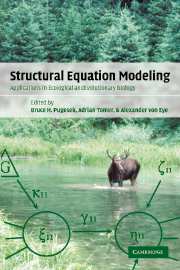Book contents
- Frontmatter
- Contents
- List of contributors
- Preface
- Section 1 Theory
- 1 Structural equation modeling: an introduction
- 2 Concepts of structural equation modeling in biological research
- 3 Modeling a complex conceptual theory of population change in the Shiras moose: history and recasting as a structural equation model
- 4 A short history of structural equation models
- 5 Guidelines for the implementation and publication of structural equation models
- Section 2 Applications
- Section 3 Computing
- Index
2 - Concepts of structural equation modeling in biological research
Published online by Cambridge University Press: 14 October 2009
- Frontmatter
- Contents
- List of contributors
- Preface
- Section 1 Theory
- 1 Structural equation modeling: an introduction
- 2 Concepts of structural equation modeling in biological research
- 3 Modeling a complex conceptual theory of population change in the Shiras moose: history and recasting as a structural equation model
- 4 A short history of structural equation models
- 5 Guidelines for the implementation and publication of structural equation models
- Section 2 Applications
- Section 3 Computing
- Index
Summary
Abstract
This chapter reviews, in a nonmathematical way, some of the key concepts that set structural equation modeling (SEM) apart from conventional parametric multivariate methods. The chapter is sectioned by the somewhat overlapping topics of measurement error, latent variables, hypothesis testing, and complex models. In the section dealing with measurement error, I describe some of the sources of measurement error found in non-experimental field data and how measurement error in concert with collinearity among independent variables can bias and distort regression path coefficients, factor loadings, and other outputs of conventional statistical methods. In the next section, latent variables, I introduce the latent variable with multiple indicators and demonstrate their efficacy for dealing with collinearity and reducing measurement error. As a result, higher precision of estimates of path coefficients may be obtained with SEM analysis over conventional methods. In the following section, hypothesis testing, I demonstrate how the use of latent variables introduces a new dimension to the analysis in the form of model fitting and hypothesis testing. Finally, I provide examples of how conventional methodologies can be extended with SEM for the analysis of complex systems.
Information
- Type
- Chapter
- Information
- Structural Equation ModelingApplications in Ecological and Evolutionary Biology, pp. 42 - 59Publisher: Cambridge University PressPrint publication year: 2003
Accessibility standard: Unknown
Why this information is here
This section outlines the accessibility features of this content - including support for screen readers, full keyboard navigation and high-contrast display options. This may not be relevant for you.Accessibility Information
- 2
- Cited by
